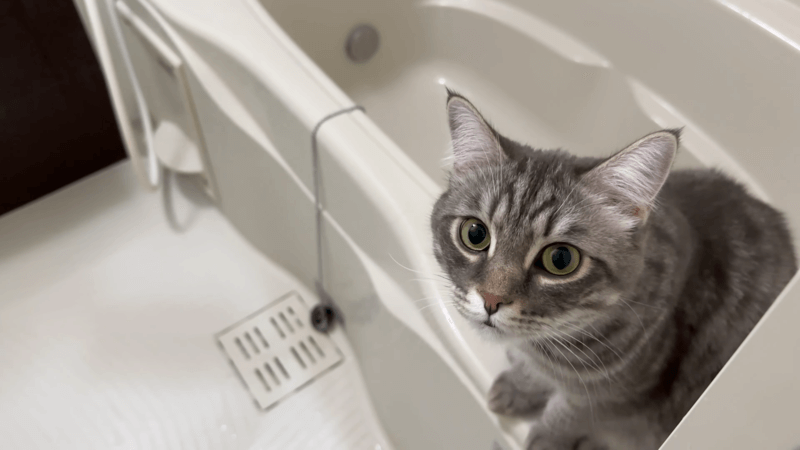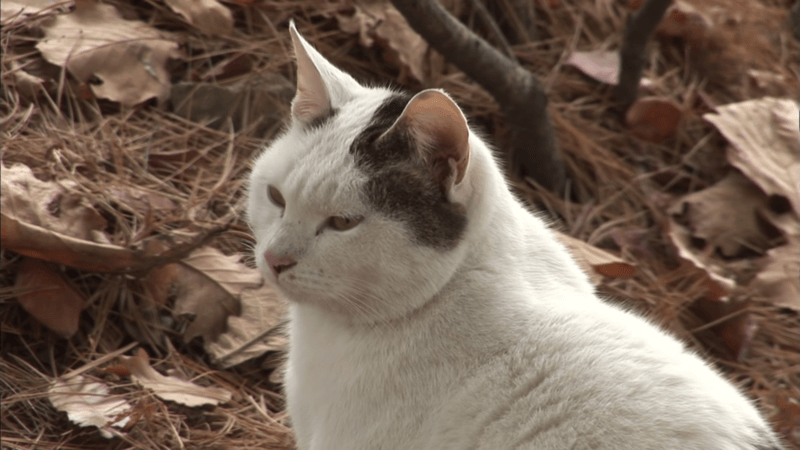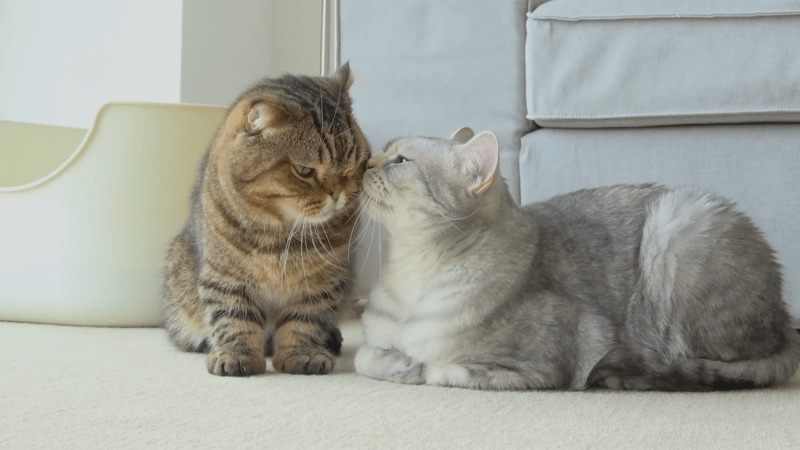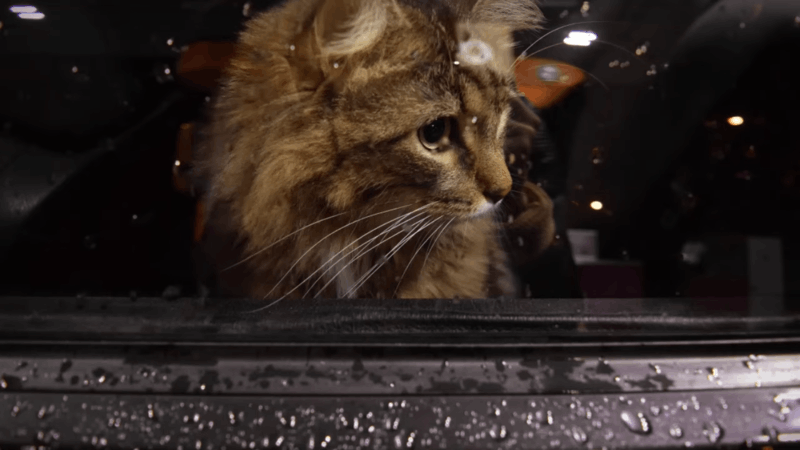No products in the cart.
The question “How does CBD treat cat depression?” arises as pet parents delve into an intriguing aspect of feline well-being. Just as a trusted friend might provide comfort during times of low spirits, CBD steps into the picture as a potential remedy for cat depression. In this blog, we’ll delve into how CBD interacts with the ECS to potentially alleviate cat depression, how does CBD treat cat depression, common symptoms of cat depression, and how to get a cat out of depression.
How Does CBD Treat Cat Depression?
Consider CBD as a mood-enhancing companion for your cat. In moments of feline emotional distress, CBD engages with cats’ “feel-good system,” the endocannabinoid system (ECS), similar to offering an encouraging conversation for their emotions. This ECS serves as an internal emotional supervisor, and CBD provides a subtle nudge that suggests, “Let’s improve that mood!” Essentially, CBD offers a modest dose of happiness to your cat in times of need.

CBD’s Role in Maintaining Balance in Cats’ Bodies
CBD is known to interact with receptors of the endocannabinoid system (ECS), which exists in mammals, including cats. The ECS is responsible for maintaining homeostasis, or internal balance, within the body. It regulates various physiological functions such as appetite, sleep, immune response, and mood.
CBD doesn’t directly bind to these receptors as THC (tetrahydrocannabinol) does, but it can influence their activity. By modulating the ECS, CBD may help restore equilibrium in various bodily processes, promoting an overall state of well-being. This can potentially help cats cope with stress, anxiety, pain, and other issues that disrupt their balance.
Advantages of CBD Oil for Cats
- Anxiety and Stress Relief: cat CBD oil may help reduce anxiety-related behaviors in cats, such as hiding, excessive grooming, or aggression, by promoting relaxation and calming effects.
- Pain Management: CBD’s potential anti-inflammatory properties could help alleviate pain and discomfort in cats suffering from conditions like arthritis or injuries.
- Appetite Stimulation: CBD may help stimulate appetite in cats that have lost interest in eating due to illness or other factors.
- Seizure Management: CBD has gained attention for its potential anticonvulsant properties, making it a consideration for cats with epilepsy or seizure disorders.
- Nausea and Vomiting: CBD might alleviate nausea and vomiting, which can be particularly useful for cats undergoing chemotherapy or experiencing gastrointestinal issues.
- Holistic Approach: CBD offers a more natural, holistic approach to supporting a cat’s well-being compared to some pharmaceutical options.
- Limited Side Effects: CBD is generally considered safe for cats when administered properly, with minimal known adverse effects.
Common Symptoms of Cat Depression
Cat depression, also referred to as feline depression or behavioral changes, can manifest through various symptoms that might resemble a change in a cat’s normal behavior. These can include:
- Lethargy: Cats may become unusually inactive, spending more time sleeping and showing less interest in their surroundings or activities.
- Loss of Appetite: Depressed cats might exhibit a decreased interest in food or water, leading to weight loss.
- Changes in Grooming: Cats may neglect their grooming routine, resulting in a disheveled appearance.
- Avoidance Behavior: Cats might isolate themselves from family members or other pets, avoiding interactions that they used to enjoy.
- Hiding: Depressed cats might seek out hiding spots or secluded areas in the home.
- Aggression or Irritability: Some cats might display increased aggression or irritability, particularly if they feel threatened or stressed.
- Excessive Vocalization: Cats may start vocalizing more than usual, which could be a sign of distress.
- Changes in Playfulness: A lack of interest in toys or playtime can be indicative of a change in mood.
- Elimination Issues: Depressed cats might exhibit inappropriate urination or defecation outside the litter box.

Cat Depression and Its Impact on Feline Health
Cat depression can have a significant impact on a cat’s general health and wellbeing if it is not treated. Depression and chronic stress can impair the immune system, leaving cats more prone to disease. Weight loss, dehydration, and nutritional deficits can also result from the physical manifestations of sadness, such as loss of appetite and lethargic behavior. A cat’s quality of life may also be impacted by untreated depression, which can result in less social interactions and a lower level of enjoyment.
When to Ask a Vet for Help With Your Cat’s Mood
If you notice persistent changes in your cat’s behavior that could indicate depression or mood issues, it’s advisable to consult a veterinarian. Some signs that might warrant professional help include:
- Severe Behavioral Changes: If your cat’s behavior has drastically changed, such as sudden aggression, extreme withdrawal, or refusal to eat or drink.
- Duration: If the changes in behavior have persisted for more than a couple of weeks.
- Lack of Improvement: If your efforts to engage and interact with your cat haven’t resulted in any improvement.
- Accompanying Symptoms: If your cat shows physical symptoms like vomiting, diarrhea, excessive grooming, or other signs of distress.
- Medical Concerns: If you suspect an underlying medical issue might be contributing to the behavioral changes.
- Expert Guidance: If you’re unsure how to help your cat or if their behavior is causing significant concern, seek advice from a veterinarian or animal behaviorist.
How to Get a Cat Out of Depression
Helping a cat recover from depression involves creating a supportive environment and engaging in activities that promote mental and emotional well-being. Here are some steps you can take:
- Consult a Veterinarian: If you suspect your cat is depressed, it’s important to rule out any underlying medical conditions that might be contributing to their behavior. A veterinarian can conduct a thorough examination and recommend appropriate treatments.
- Provide Enrichment: Engage your cat’s senses by offering new toys, scratching posts, puzzle feeders, and interactive play sessions. This can stimulate their mind and help alleviate boredom.
- Interactive Play: Engage your cat in interactive games using toys like feather wands or laser pointers. This not only keeps them physically active but also strengthens their bond.
- Gentle Grooming: Regular grooming sessions can be soothing for cats. Use a soft brush and take the time to groom them gently.
- Create a Safe Space: Ensure your cat has a quiet and comfortable space where they can retreat when they need privacy and relaxation.
- Positive Reinforcement: Reward positive behaviors with treats or affection to encourage them to engage more actively with their environment.
- Social Interaction: Spend quality time with your cat, engaging in activities they enjoy, such as petting, talking to them, or simply sitting nearby.
- Routine and Predictability: Cats thrive on routine. Stick to a consistent schedule for feeding, playtime, and other activities.
- Companionship: If your cat gets along with other animals, consider adopting a second cat as a companion.
- Consult a Professional: In severe cases of depression, consider working with an animal behaviorist or veterinarian with experience in feline behavior to develop a tailored plan.

Tips on Preventing a Cat From Having Depression
Preventing cat depression involves creating a positive and stimulating environment that supports your cat’s physical and emotional well-being. Here are some steps you can take:
- Routine and Stability: Cats thrive on routine. Maintain a consistent daily schedule for feeding, playtime, and interactions.
- Enrichment: Provide toys, scratching posts, and interactive play to keep your cat mentally and physically engaged.
- Social Interaction: Spend quality time with your cat through petting, grooming, and gentle play. Positive interactions strengthen the bond between you and your cat.
- Safe Space: Ensure your cat has a quiet and comfortable space where they can retreat when they need privacy or relaxation.
- Healthy Diet: Feed your cat a balanced and appropriate diet to support their physical health.
- Veterinary Care: Regular check-ups with a veterinarian can help identify any underlying medical issues that might contribute to changes in behavior.
- Companionship: If your cat enjoys the company of other animals, consider adopting a second cat for companionship.
- Positive Reinforcement: Reward good behavior with treats and affection to create a positive association with positive behaviors.
Ways to Play and Bond With a Sad Cat
- Feather Wands: Cats often love to chase and pounce on feather wands. This mimics natural hunting behavior.
- Interactive Toys: Toys that move or make noise can captivate your cat’s attention and stimulate their playfulness.
- Hide and Seek: Hide treats or toys around the house for your cat to find. This engages their senses and encourages exploration.
- Window Watching: Place a perch near a window so your cat can watch birds, squirrels, or other outdoor activities.
- Catnip Play: Use catnip-infused toys or scratching posts to trigger playful behavior.
- Tunnel Time: Cats enjoy exploring tunnels and boxes. Set up a cardboard box with holes or a collapsible tunnel for them to play in.
- Treat Puzzle Toys: These toys dispense treats as your cat interacts with them, providing mental stimulation.
Conclusion
The answer to the question, “How does CBD treat cat depression?” inspires investigation into the substance’s potential to improve feline wellbeing. The endocannabinoid system is activated by CBD, which is a viable method for reducing cat sadness. This highlights CBD as a holistic strategy worth taking into consideration, along with its function in preserving balance and several benefits, including anxiety alleviation and pain treatment. We can ensure that our cherished cats enjoy happier, more fulfilled lives by creating a supportive environment and getting professional help.
I am Nelson Cooper, I pursue my passion for writing and my belief is that cats love humans. I enjoy traveling and have a deep appreciation for the beauty of nature, as well as a soft spot for animals, particularly cats.



